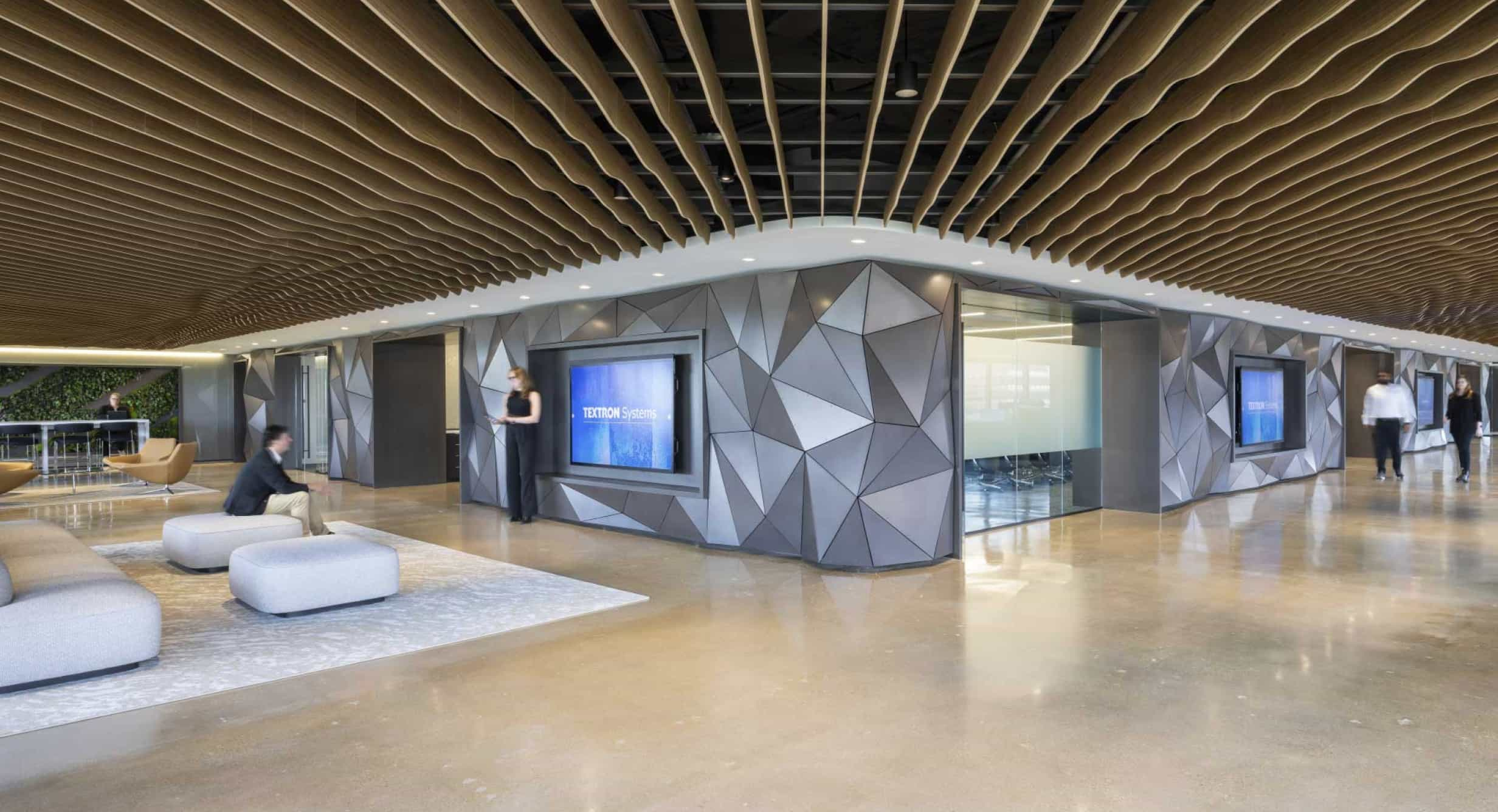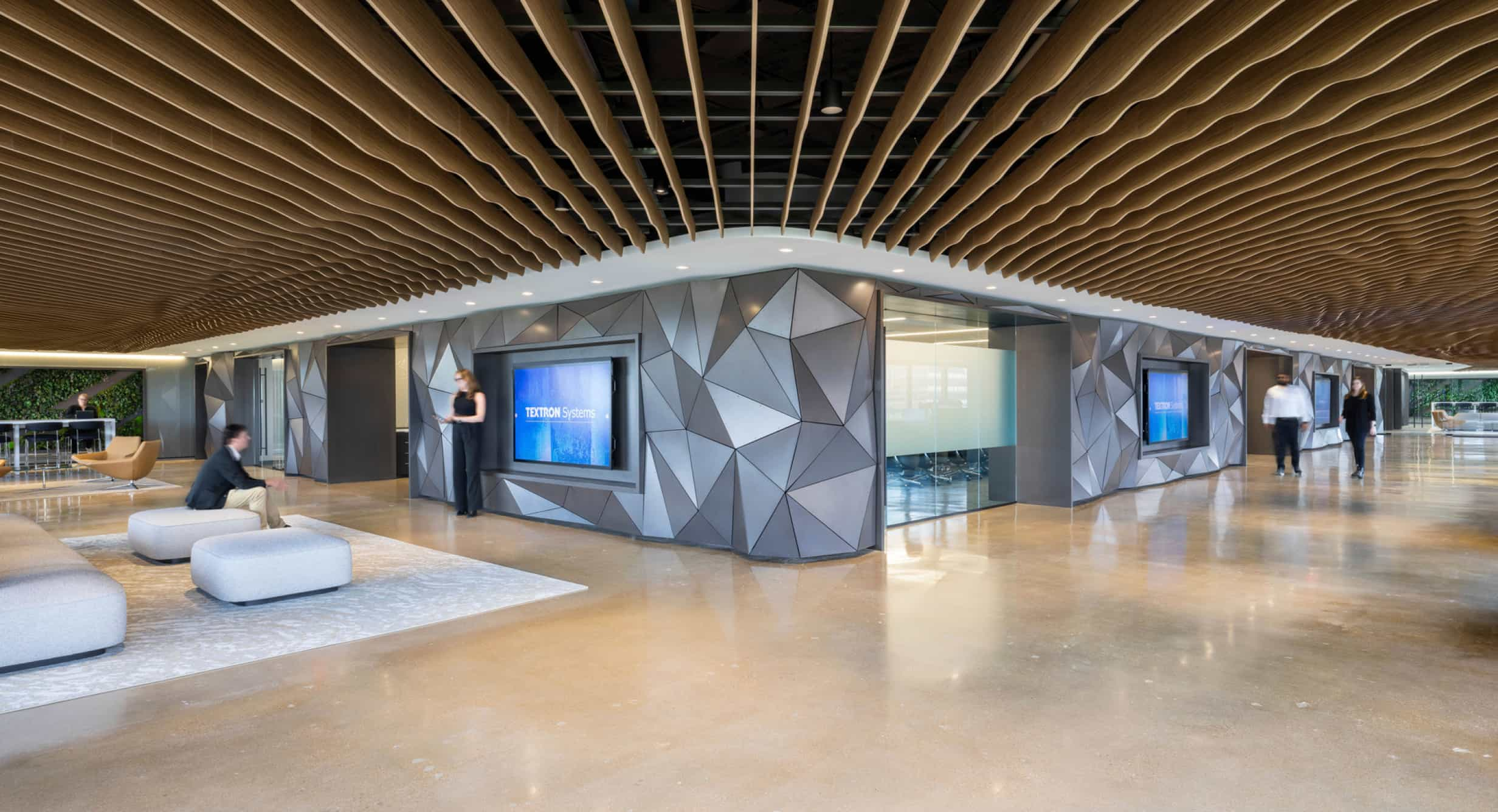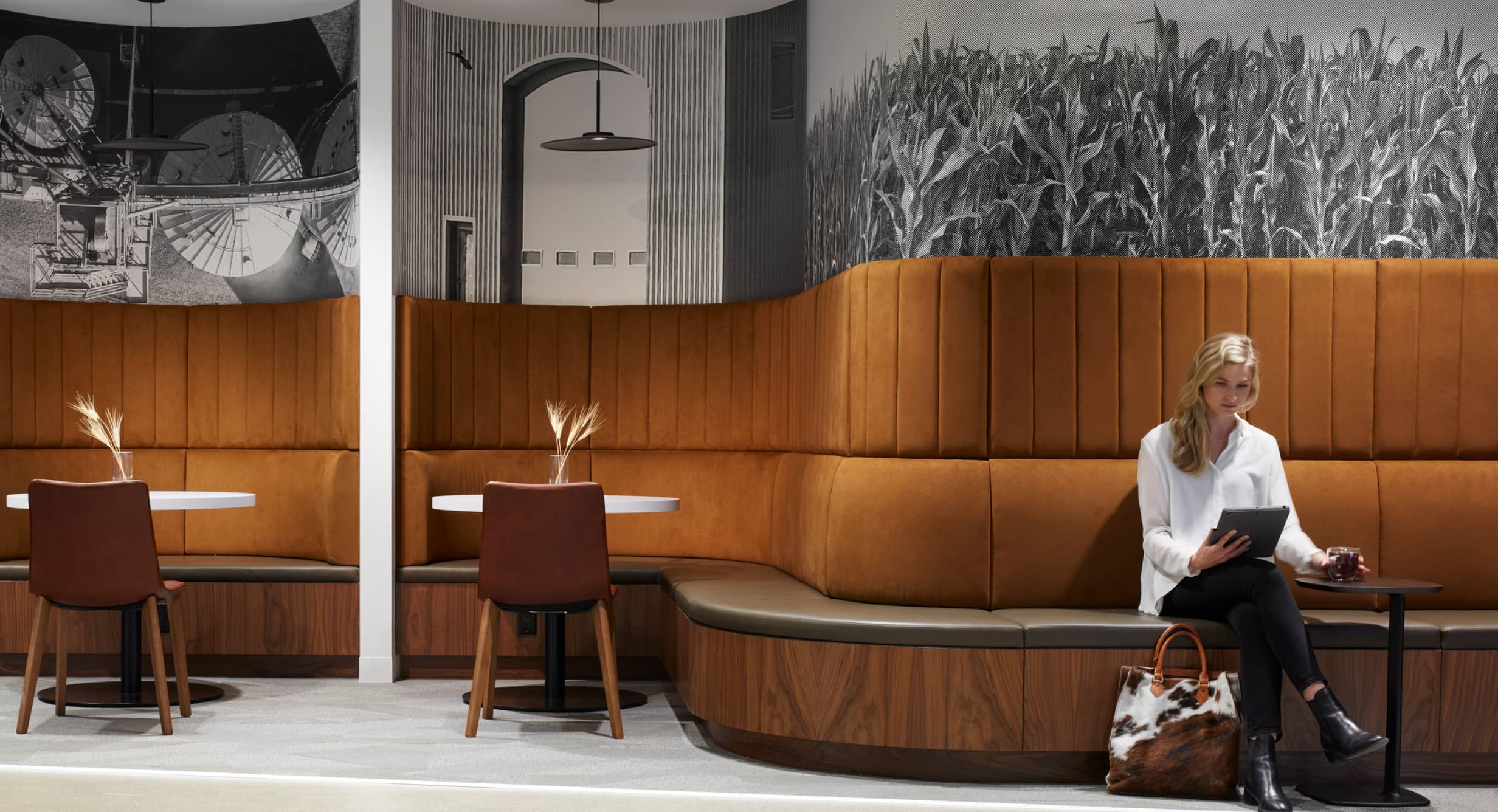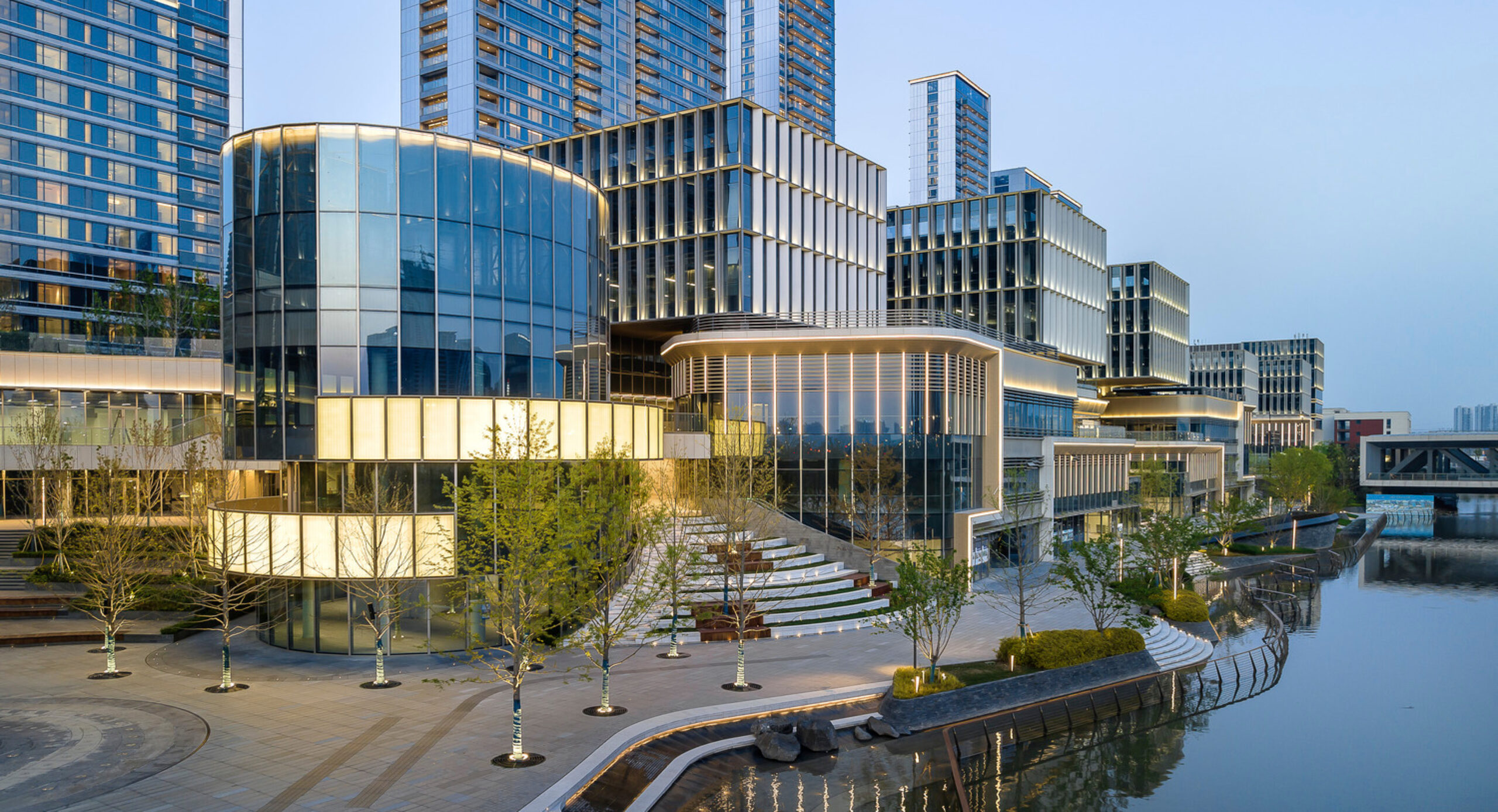
Five Design Trends Shaping Communities in 2024
- Kathleen M. O’Donnell
- Amy Eagle
Advances in artificial intelligence, modular construction and other methodologies will bring renewed energy to the architecture, engineering and construction industry in 2024 despite economic and environmental challenges.
In response to — and at the forefront of — current real estate and design trends, global design firm HKS is striving to revive and strengthen communities worldwide. In 2024, HKS will continue to create healthy, resilient, dynamic places that support peak performance and bring people joy.
1 – Spaces for Healthy Living and Learning
HKS is leveraging the firm’s research and health design expertise to help people navigate ongoing and emerging crises in health care, student health and well-being, and senior living.
The Sanford Health Virtual Care Center in Sioux Falls, South Dakota is one of several exciting HKS health care projects opening in 2024. The telehealth center will improve access to care for rural patients, a medically underserved population.
Clinical workforce shortages will be a continuing challenge for health systems in the year ahead, according to McKinsey & Company. HKS is designing facilities to address the health care staffing crisis. To further this work, the firm is partnering with design brand MillerKnoll on a study to identify factors that contribute to nurse burnout and to learn how these factors relate to the built environment. The study findings will be published this year.
This year HKS will also participate in an impact study to gauge how the design of Uplift Luna Preparatory School, which is scheduled to open in Dallas in January, affects student outcomes. HKS’ design of the school was informed by research into how design can support social and emotional learning.
At the 2024 Environments for Aging conference, HKS and industry partners will present a case study of Elevate Senior Living’s Clearwater, Florida community. HKS’ design for Elevate Clearwater is intended to help address the senior living affordability crisis. The number of middle-income older adults in need of affordable care and housing options is swiftly rising, as demonstrated by a study into the “forgotten middle” senior cohort, by research group NORC at the University of Chicago.
2 – Commercial Office Reinvention
It’s clear by now that hybrid and remote work are here to stay. Changes to work habits over the last four years caused major fluctuations in corporate real estate portfolios, leading to increased vacancy rates and diminishing valuations worldwide. But according to Deloitte’s 2024 commercial real estate outlook, newer, higher quality assets are outperforming older spaces and new construction projects designed to accommodate hybrid work strategies are on the rise.
HKS commercial interior designers are creating offices with hybrid-ready technologies and attractive amenities for companies like Textron Systems in Arlington, Virginia and AGI in Naperville, Illinois. HKS’ advisory groups have also teamed with influential companies, including CoreLogic, to develop strategies and design concepts for their robust asset portfolios that help them keep up with the evolving real estate landscape.
The firm’s industry-leading research on brain healthy workplaces has yielded exciting discoveries about how offices that prioritize employee well-being can be designed, delivered and operated. Piloting strategies in the firm’s own real estate portfolio and advocating for “breaking the workstation,” HKS researchers and designers are setting new standards for inclusive, productive office environments. In 2024, HKS will present these ideas to a global audience at South by Southwest® (SXSW®) and continue to design workplaces for new modes of working.
3 – New Mixed-Use and Planning Match Ups
Fluctuations in the commercial office sector and retail are providing new opportunities in mixed-use development. PwC and ULI’s Emerging Trends in Real Estate 2024 report indicates that real estate investors are increasingly diversifying or pivoting their portfolios to counteract disuse of downtown offices and regional malls.
A shift toward developments with a variety of localized services and amenities is occurring — and HKS designers and planners are at the forefront of creating exciting new projects with unique anchors. In Hangzhou, China, the 2023 Asian Games Athlete Village Waterfront Mixed-Use is becoming a prime destination for retail and entertainment, not unlike HKS-designed SoFi Stadium and Hollywood Park in Los Angeles with its newest attraction, Cosm. Beyond these new mixes, HKS designers are creating dynamic properties such as NoMaCNTR in Washington, DC, to join hotel and residential uses — a combination on the rise in many major cities.
In 2024, HKS is expanding its ability to serve communities with mixed-use planning and design, fostering sustainable growth for cities in the years to come. The Austin Light Rail team — consisting of Austin Transit Partnership, HKS, UNStudio and Gehl — is set to finalize design guidelines for proposed station locations that will provide opportunities for Austin residents to live in more affordable locations and promote urban expansion into less dense areas. As the transit network expands, it will unlock real estate opportunities and give rise to a variety of diverse and exciting mixed-use properties. This work complements the Transit Oriented Developments projects HKS is working on to elevate the health and well-being of our communities nationwide.
HKS designers are also set to craft a new master plan for the Georgia World Congress Center’s 220-acre campus in downtown Atlanta this year. The cohesive, sustainability-driven master plan will create a legible pedestrian-friendly environment that maximizes economic potential of the convention center campus. This will integrate the campus’ global canvas with surrounding historic neighborhoods using a comprehensive framework.
4 – Adaptive Reuse Rising
In their report on 2024 real estate trends, PwC and ULI write that that “the movement to convert existing buildings from office to multifamily (or any other asset class, really), offers a meaningful achievement in saving carbon emissions.”
As part of HKS’ efforts towards sustainable and resilient design, the firm is igniting adaptive reuse for a variety of building types, such as ParkwayHealth Gleneagles Chengdu Hospital in China, a tertiary care facility created from a former shopping center. HKS’ design for Mount Sinai Beth Israel Comprehensive Behavioral Health Center in New York City reinvigorated a structure built in 1898 to create a new destination for behavioral health. HKS designers in London renovated a 19th-century office building into a 21st-century clinic. And for an expansion of Rusk State Hospital in Texas, HKS reinvented the hospital campus, which opened in 1883 to house a penitentiary, into a therapeutic and dignified behavioral health care setting.
In a highly poetic adaptive reuse project, HKS reimagined a defunct airport terminal, which dated to the 1940s, as a creative, contemporary workspace for online travel company Expedia Group.
In 2024, HKS will continue to advance adaptive reuse design across different markets and geographies.
5 – Creating a Better World through ESG
Balancing holistic sustainability — including decarbonization, climate resilience, and equitable design practices — with business goals is imperative for commercial real estate investors according to 2024 outlooks by both Deloitte and PwC. Leading the architecture and design industries to a brighter future, HKS is committed to Environmental, Social and Governance (ESG).
HKS leaders recently demonstrated the depth of the firm’s ESG efforts through thought leadership — speaking at the United Nations Climate Change Conference, the United Nations Science Summit on Brain Capital, and at the National Organization of Minority Architects (NOMA) conference, where HKS was also a Diamond Sponsor.
Driven by ESG goals, HKS designers strive to enhance human and environmental well-being through the places they create day in and day out. The firm’s growing portfolio of high-performing projects includes the world’s first WELL-certified airport facility, a COTE Top-Ten Award-winning campus in California and a IIDA Global Excellence Award finalist hospital in Saudi Arabia to name a few. In 2024, HKS architects, sustainable design leaders and advisors will continue developing building portfolio sustainability guidelines and high-performance designs for major tech companies and educational institutions.
HKS will also align with the Science Based Targets Initiative, which recently established building sector guidelines, to ensure the firm’s carbon neutrality goals are science-backed and can be properly benchmarked. The firm will provide voluntary disclosures about its offsets portfolio to meet regulatory requirements, enhance transparency and improve accountability.
Most excitingly, 2024 marks the 10-year anniversary of Citizen HKS, a firmwide initiative that impacts lives and drives change through design, community service and financial philanthropy. HKS designers around the world will celebrate the pro-bono design work and service projects they have contributed to through Citizen HKS and re-commit to enhancing their communities for years to come.





